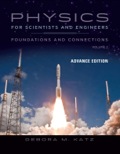
Concept explainers
(a)
The rotation rate after the glitch.
(a)
Answer to Problem 15PQ
The rotation rate after the glitch is
Explanation of Solution
From Example 12.2, it is found that the original rotation rate is
Write the expression for the rotation rate after the glitch.
Here,
It is given that the fractional increase in rotation rate is,
Solve equation (II) for
This shows that the rotation rate after the glitch is almost equal to the original rotation rate since the change is negligibly small compared to the original rate. Thus, substituting
Conclusion:
Therefore, the rotation rate after the glitch is
(b)
The new
(b)
Answer to Problem 15PQ
The new angular acceleration is
Explanation of Solution
From Example 12.2, it is found that the magnitude of original angular acceleration is
Write the expression for the angular acceleration after the glitch.
Here,
It is given that the fractional increase in angular acceleration is,
Solve equation (II) for
Conclusion:
Substitute
Therefore, the new angular acceleration is
(c)
The time taken for the pulsar to return to its pre-glitch rotation rate.
(c)
Answer to Problem 15PQ
The time taken for the pulsar to return to its pre-glitch rotation rate is
Explanation of Solution
It is obtained that the angular acceleration after the glitch is
Write the expression for the angular frequency in term of the angular acceleration.
Here,
Solve equation (VIII) for
Multiply and divide the right-hand side of equation (IX) by
Conclusion:
Substitute
Therefore, the new angular acceleration is
Want to see more full solutions like this?
Chapter 12 Solutions
EBK PHYSICS FOR SCIENTISTS AND ENGINEER
- The Fiero, which is 4.70 m long, starts at 10.0˚C while in the upper atmosphere but when it goes into space the temperature would be about -270.3˚C. How much should the steel siding of the Fiero shrink due to this temperature change? The coefficient of thermal linear expansion for steel is 11.0⋅10−6⋅10^-6 C-1arrow_forwardQuestion 3 of 17 L X L L T 0.5/ In the figure above, three uniform thin rods, each of length L, form an inverted U. The vertical rods each have a mass m; the horizontal rod has a mass 3m. NOTE: Express your answer in terms of the variables given. (a) What is the x coordinate of the system's center of mass? xcom L 2 (b) What is the y coordinate of the system's center of mass? Ycom 45 L X Q Search MD bp Narrow_forwardSketch the harmonic on graphing paper.arrow_forward
- Exercise 1: (a) Using the explicit formulae derived in the lectures for the (2j+1) × (2j + 1) repre- sentation matrices Dm'm, (J/h), derive the 3 × 3 matrices corresponding to the case j = 1. (b) Verify that they satisfy the so(3) Lie algebra commutation relation: [D(Î₁/ħ), D(Î₂/h)]m'm₁ = iƊm'm² (Ĵ3/h). (c) Prove the identity 3 Dm'm,(β) = Σ (D(Ρ)D(Ρ))m'¡m; · i=1arrow_forwardSketch the harmonic.arrow_forwardFor number 11 please sketch the harmonic on graphing paper.arrow_forward
- # E 94 20 13. Time a) What is the frequency of the above wave? b) What is the period? c) Highlight the second cycle d) Sketch the sine wave of the second harmonic of this wave % 7 & 5 6 7 8 * ∞ Y U 9 0 0 P 150arrow_forwardShow work using graphing paperarrow_forwardCan someone help me answer this physics 2 questions. Thank you.arrow_forward
- Four capacitors are connected as shown in the figure below. (Let C = 12.0 μF.) a C 3.00 με Hh. 6.00 με 20.0 με HE (a) Find the equivalent capacitance between points a and b. 5.92 HF (b) Calculate the charge on each capacitor, taking AV ab = 16.0 V. 20.0 uF capacitor 94.7 6.00 uF capacitor 67.6 32.14 3.00 µF capacitor capacitor C ☑ με με The 3 µF and 12.0 uF capacitors are in series and that combination is in parallel with the 6 μF capacitor. What quantity is the same for capacitors in parallel? μC 32.14 ☑ You are correct that the charge on this capacitor will be the same as the charge on the 3 μF capacitor. μCarrow_forwardIn the pivot assignment, we observed waves moving on a string stretched by hanging weights. We noticed that certain frequencies produced standing waves. One such situation is shown below: 0 ст Direct Measurement ©2015 Peter Bohacek I. 20 0 cm 10 20 30 40 50 60 70 80 90 100 Which Harmonic is this? Do NOT include units! What is the wavelength of this wave in cm with only no decimal places? If the speed of this wave is 2500 cm/s, what is the frequency of this harmonic (in Hz, with NO decimal places)?arrow_forwardFour capacitors are connected as shown in the figure below. (Let C = 12.0 µF.) A circuit consists of four capacitors. It begins at point a before the wire splits in two directions. On the upper split, there is a capacitor C followed by a 3.00 µF capacitor. On the lower split, there is a 6.00 µF capacitor. The two splits reconnect and are followed by a 20.0 µF capacitor, which is then followed by point b. (a) Find the equivalent capacitance between points a and b. µF(b) Calculate the charge on each capacitor, taking ΔVab = 16.0 V. 20.0 µF capacitor µC 6.00 µF capacitor µC 3.00 µF capacitor µC capacitor C µCarrow_forward
 Principles of Physics: A Calculus-Based TextPhysicsISBN:9781133104261Author:Raymond A. Serway, John W. JewettPublisher:Cengage Learning
Principles of Physics: A Calculus-Based TextPhysicsISBN:9781133104261Author:Raymond A. Serway, John W. JewettPublisher:Cengage Learning Physics for Scientists and Engineers: Foundations...PhysicsISBN:9781133939146Author:Katz, Debora M.Publisher:Cengage Learning
Physics for Scientists and Engineers: Foundations...PhysicsISBN:9781133939146Author:Katz, Debora M.Publisher:Cengage Learning Physics for Scientists and Engineers, Technology ...PhysicsISBN:9781305116399Author:Raymond A. Serway, John W. JewettPublisher:Cengage Learning
Physics for Scientists and Engineers, Technology ...PhysicsISBN:9781305116399Author:Raymond A. Serway, John W. JewettPublisher:Cengage Learning
 College PhysicsPhysicsISBN:9781285737027Author:Raymond A. Serway, Chris VuillePublisher:Cengage Learning
College PhysicsPhysicsISBN:9781285737027Author:Raymond A. Serway, Chris VuillePublisher:Cengage Learning Classical Dynamics of Particles and SystemsPhysicsISBN:9780534408961Author:Stephen T. Thornton, Jerry B. MarionPublisher:Cengage Learning
Classical Dynamics of Particles and SystemsPhysicsISBN:9780534408961Author:Stephen T. Thornton, Jerry B. MarionPublisher:Cengage Learning





